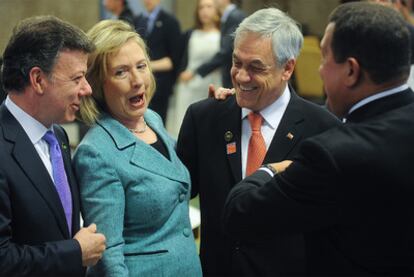Chile grapples with gas protests at southern resorts
Argentina files protest with Chilean government after hundreds of citizens stranded across the border
The Chilean government is busy trying to resolve a series of blockades and sit-ins at two of the country's most pristine tourist areas - Tierra de Fuego and Easter Island - that has stranded tourists and pushed tensions to the limit at the height of the summer season.
On Tuesday, after days of blockades in and around the southern Chilean city of Punta Arenas to protest government cuts in gasoline subsidies, picketers agreed to allow traffic to run after reaching an agreement.
However, Tierra del Fuego province governor Fabiana Ríos said she didn't rule out that the blockades would be reinstated.
Argentina filed a protest over the weekend with the Chilean government after hundreds of its citizens were stranded across the border on the Tierra del Fuego island the two countries share. The chaos comes at the height of the southern hemisphere's high season.
"Right now there are about 100 stranded vehicles, but there have been some people who were able to cross the border after 48 hours," Rios told a Chilean radio station on Monday.
Some 250 Argentineans had to be evacuated by land and another 113 in two air force planes, which took them across the border. Most of them had arrived on the Chilean side by bus.
"Just because they broke up the picket line doesn't mean that there won't be more blockades," said Eleonora de Maio, the Argentinean governor of Tierra de Fuego province, as quoted in the Buenos Aires daily La Nación.
Magallanes Citizens Assembly, which had called the protests, announced Tuesday that it had reached an agreement with the Santiago government, which pledged to continue to offer residents of the province gasoline subsidies. Because of its remoteness Magallanes province is the only area to receive such subsidies.
Last week Chilean Energy Minister Laurence Golborne announced that gasoline would be raised to 16 percent for customers in the area, which ignited a series of protests with citizens burning tires and vehicles on some of the main roads connecting Punta de Arenas.
Rapa Nui anger
The Chilean government of President Sebastián Piñera has come under United Nations criticism for the way it has been handling an indigenous protest in Easter Island. Since August, hundreds of Rapa Nui Indians have been occupying hotels and government buildings in the main town of Hanga Roa. They are protesting what they called the Piñera government's reneging on a UN pledge signed by the previous administration of Michelle Bachelet over the rights to preserve indigenous lands. Chile is a signatory of UN Convention 169, which outlines tribal people's rights in different countries.
Piñera has defended a series of forceful evictions to maintain public order. The Rapa Nui said that they resorted to occupying buildings and other areas after the government failed to meet with them.
UN Special Rapporteur James Anaya said in a statement on Monday that he was dismayed by the lack of dialogue and asked the government to "avoid new evictions and police presence in the island that exceeds what is necessary and proportional."

Tu suscripción se está usando en otro dispositivo
¿Quieres añadir otro usuario a tu suscripción?
Si continúas leyendo en este dispositivo, no se podrá leer en el otro.
FlechaTu suscripción se está usando en otro dispositivo y solo puedes acceder a EL PAÍS desde un dispositivo a la vez.
Si quieres compartir tu cuenta, cambia tu suscripción a la modalidad Premium, así podrás añadir otro usuario. Cada uno accederá con su propia cuenta de email, lo que os permitirá personalizar vuestra experiencia en EL PAÍS.
¿Tienes una suscripción de empresa? Accede aquí para contratar más cuentas.
En el caso de no saber quién está usando tu cuenta, te recomendamos cambiar tu contraseña aquí.
Si decides continuar compartiendo tu cuenta, este mensaje se mostrará en tu dispositivo y en el de la otra persona que está usando tu cuenta de forma indefinida, afectando a tu experiencia de lectura. Puedes consultar aquí los términos y condiciones de la suscripción digital.








































